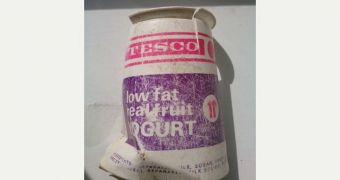Volunteer environmentalists who cleaned up Britain's beaches in a four-day blitz at the end of March came across millions of items of rubbish washed up on the coastline, including a 40-year-old Yoghurt Pot.
Activists involved in the massive coastal clean-up exercise collected a staggering 25 tonnes of marine litter from beaches up and down the UK and were surprised to find plastic litter dumped four decades ago.
The faded and cracked plastic packaging dating back to the 1970s was discovered by volunteers from Surfers Against Sewage (SAS) on a beach in Teignmouth, Devon, while searching through the tonnes of marine trash.
The expiration date was no longer visible on the yoghurt pot, but the Tesco label remained clear despite the fact that no less than 40 years have passed since it was bought from a Tesco store for 11p ($0.18/€0.13).
Among the weird items found during the clean-up operation were thousands of Lego pieces washed off a container ship in 1997, a TV, a set of dentures, and a plastic chicken.
“Whilst removing shocking amounts of the usual marine litter suspects like plastic bottles, cigarette butts, fishing net and plastic bags, volunteers were also hunting for weird and wonderful items of marine litter,” SAS chief executive, Hugo Tagholm, said, according to Daily Mail.
He also mentioned he had been “overwhelmed” by the high number of people who supported the group's Big Spring Beach Clean. Apparently, more than 3,500 people volunteered to help clean up 130 beaches in UK, from Land's End to John O'Groats.
The high amount of floating rubbish collected by the campaign group indicates that marine pollution is growing despite efforts to recycle, especially because more trash is thrown into the seas every day.
“The discovery of the yoghurt pot just shows how far and for how long this stuff travels as well as how long it takes to degrade - if it ever does,” said Tim Andrewes, Cornwall Council’s first elected Green Party councilor.
He also highlighted that the flotsam discarded irresponsibly posed a big threat to marine animals, which regularly wash up dead with stomachs full of plastic.
It is well known that plastics don't decompose the same way organic material does. Wood, grass and food scraps undergo a process known as biodegradation, but plastic bags, for example, are estimated to take approximately 1,000 years to degrade. This means that, unless they are disposed of properly, they form long-lasting litter.

 14 DAY TRIAL //
14 DAY TRIAL //